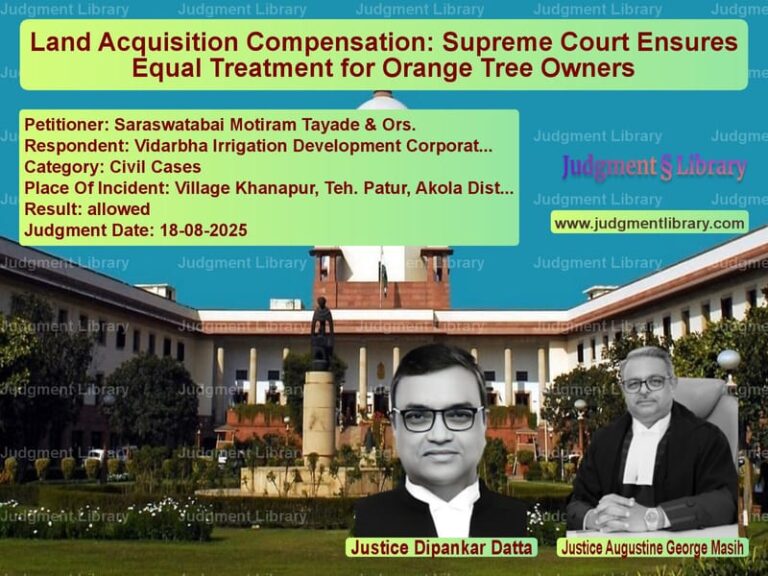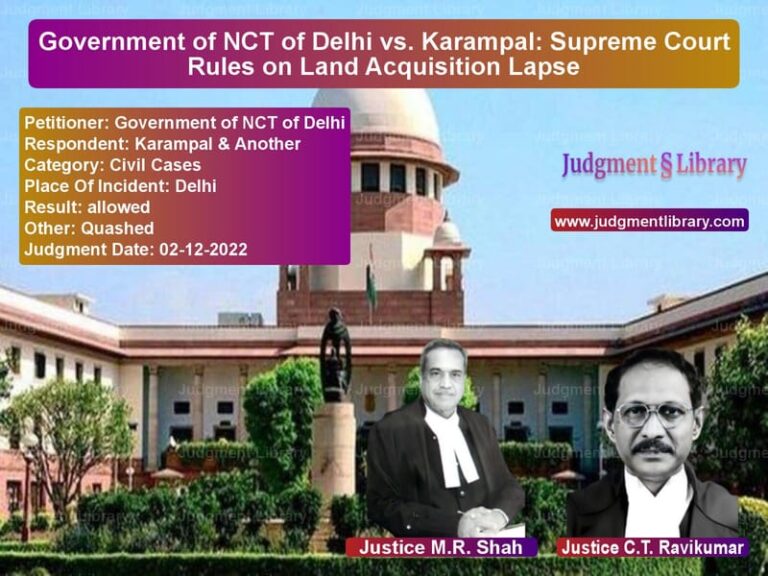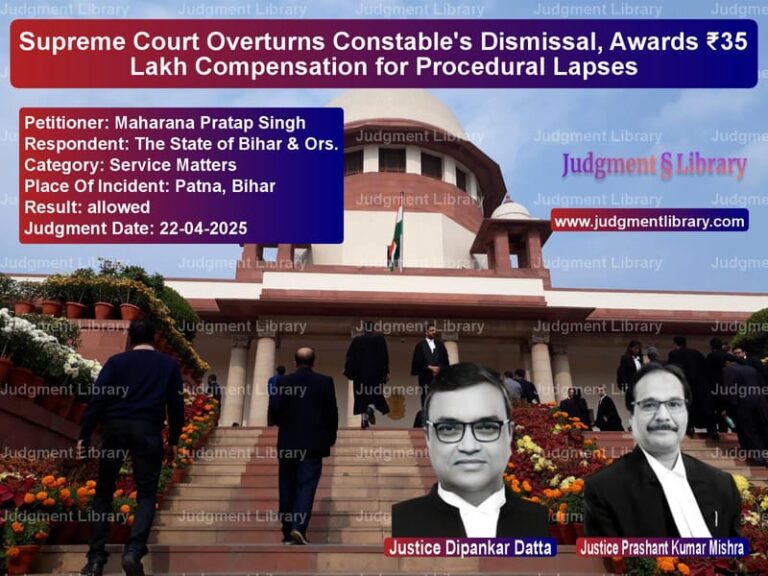Supreme Court Strikes Down Gujarat’s COVID-19 Labour Law Exemptions
The case of Gujarat Mazdoor Sabha & Anr. vs. State of Gujarat is a landmark judgment by the Supreme Court of India that examines the validity of exemptions granted to factories from certain labour laws during the COVID-19 pandemic. The Gujarat government, invoking emergency powers under the Factories Act, 1948, had issued notifications exempting factories from obligations related to working hours, overtime wages, and other worker protections. The Supreme Court struck down these notifications, holding them unconstitutional and an affront to labour rights.
The ruling reaffirms that economic hardships faced by businesses cannot be addressed by imposing excessive burdens on workers. The judgment safeguards workers’ rights, upholding the principles of fair wages, humane working conditions, and the constitutional vision of social and economic justice.
Background of the Case
On April 17, 2020, during the nationwide COVID-19 lockdown, the Gujarat government issued a notification under Section 5 of the Factories Act, 1948, exempting all registered factories from provisions regulating weekly hours, daily hours, intervals for rest, and overtime wages. A second notification was issued on July 20, 2020, extending these exemptions until October 2020.
Key changes introduced by these notifications:
- Increase in daily work hours from 9 hours to 12 hours
- Increase in weekly work hours from 48 hours to 72 hours
- Elimination of spread-over time limits, rest periods, and overtime wages
- Overtime wages were to be paid at a proportional rate instead of double the ordinary rate, violating Section 59 of the Factories Act
These measures were challenged by Gujarat Mazdoor Sabha, a registered trade union representing workers across Gujarat, and another federation of trade unions representing workers nationwide.
Petitioners’ (Gujarat Mazdoor Sabha) Arguments
The petitioners, represented by senior counsel Sanjay Singhvi and Aparna Bhat, argued:
- Public Emergency Misuse: Section 5 of the Factories Act permits exemptions only in a ‘public emergency’ involving war, external aggression, or internal disturbance. A pandemic and economic downturn do not qualify.
- Violation of Labour Laws: The exemptions removed statutory protections designed to safeguard workers’ health, rest periods, and fair wages.
- Forced Labour: Paying overtime wages at a proportional rate instead of double the normal wage violates Article 23 (Right Against Forced Labour) and Article 21 (Right to Life) of the Constitution.
- Factories Act Violations: The exemptions bypassed statutory limits set under Sections 51, 54, 55, 56, and 59 of the Factories Act.
- Arbitrary and Unjustified Exemptions: Exempting all factories, regardless of industry type, was arbitrary and unjustified.
- Worker Exploitation: Extending work hours without fair compensation would lead to fatigue, hazardous working conditions, and industrial accidents.
Respondent’s (State of Gujarat) Arguments
The Gujarat government, represented by Solicitor General Tushar Mehta and Deepanwita Priyanka, defended the notifications, arguing:
- COVID-19 as a Public Emergency: The pandemic disrupted economic activity, creating an internal disturbance warranting emergency measures under Section 5 of the Factories Act.
- Economic Necessity: The exemptions were necessary to revive industrial production and stabilize the economy.
- No Exploitation: Workers were still being paid in proportion to the increased work hours, ensuring fair compensation.
- Legitimate Government Power: Section 5 allows the government to exempt factories from specific legal provisions in times of emergency.
Supreme Court’s Observations and Judgment
The Supreme Court, led by Dr. Dhananjaya Y. Chandrachud, Indu Malhotra, and K.M. Joseph, made the following key observations:
- No Public Emergency: The COVID-19 pandemic, though a severe crisis, did not constitute an ‘internal disturbance’ threatening national security, as required under Section 5 of the Factories Act.
- Overreach of Executive Powers: The Gujarat government’s actions were beyond the scope of its legal authority under the Factories Act.
- Violation of Fundamental Rights: The exemptions denied workers fair wages and humane working conditions, violating Article 21 (Right to Life) and Article 23 (Protection Against Forced Labour).
- Labour Rights Cannot Be Compromised: Economic distress does not justify suspending worker protections. The burden of economic recovery cannot fall solely on labourers.
- Factories Act Safeguards Worker Welfare: The Court reaffirmed that the Factories Act is designed to protect workers from exploitation, ensuring fair compensation and safe working conditions.
The judgment cited past rulings, including K.S. Puttaswamy vs. Union of India (2017) and Bhikusa Yamasa Kshatriya (P) Ltd. vs. Union of India (1963), emphasizing the importance of proportionality and economic justice.
Final Judgment
The Supreme Court ruled:
- The Gujarat government’s notifications were quashed as unconstitutional.
- Workers must be paid overtime wages as per Section 59 of the Factories Act (double the regular wages).
- Factories must comply with statutory working hour limits.
- The State cannot suspend labour protections under the pretext of economic revival.
Conclusion
This ruling is a significant victory for worker rights and constitutional safeguards. The Supreme Court reaffirmed that economic hardships cannot justify suspending labour laws. The judgment ensures that worker protections under the Factories Act remain intact, reinforcing the core principles of fair wages, humane working conditions, and social justice.
Petitioner Name: Gujarat Mazdoor Sabha & Anr..Respondent Name: State of Gujarat.Judgment By: Justice Dhananjaya Y Chandrachud, Justice Indu Malhotra, Justice K.M. Joseph.Place Of Incident: Gujarat.Judgment Date: 01-10-2020.
Don’t miss out on the full details! Download the complete judgment in PDF format below and gain valuable insights instantly!
Download Judgment: Gujarat Mazdoor Sabh vs State of Gujarat Supreme Court of India Judgment Dated 01-10-2020.pdf
Direct Downlaod Judgment: Direct downlaod this Judgment
See all petitions in Employment Disputes
See all petitions in Workplace Harassment
See all petitions in Judgment by Dhananjaya Y Chandrachud
See all petitions in Judgment by Indu Malhotra
See all petitions in Judgment by K.M. Joseph
See all petitions in allowed
See all petitions in Quashed
See all petitions in supreme court of India judgments October 2020
See all petitions in 2020 judgments
See all posts in Service Matters Category
See all allowed petitions in Service Matters Category
See all Dismissed petitions in Service Matters Category
See all partially allowed petitions in Service Matters Category







